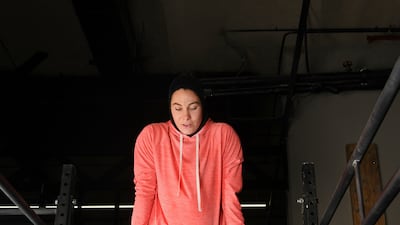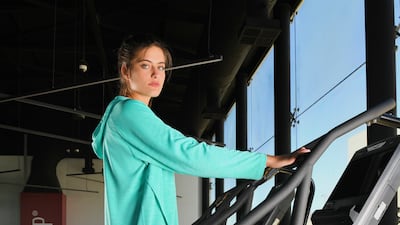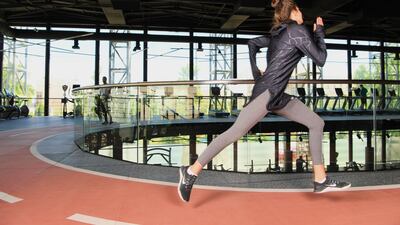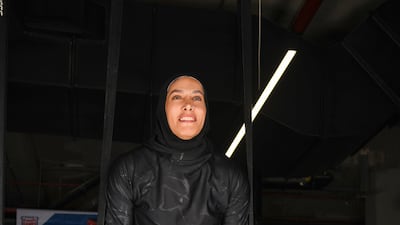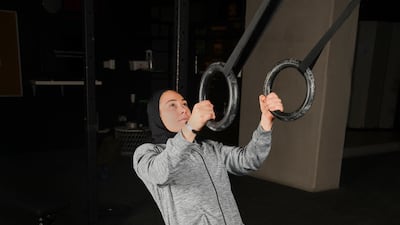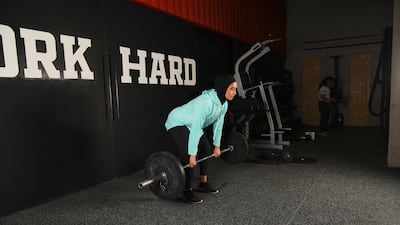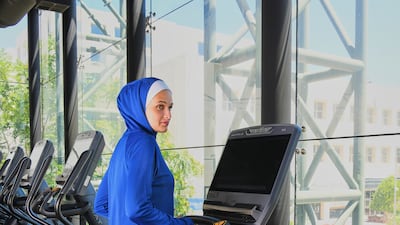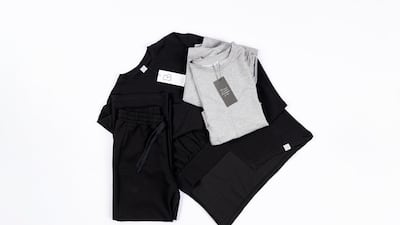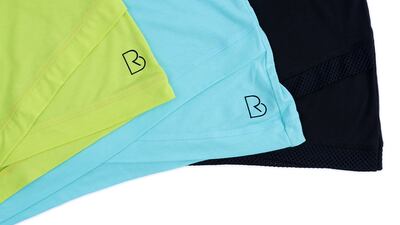RB Fashion was founded in 2019 by Rawan Al Adwan and her sister Bayan. Their initials give the company its name and it started out offering customised modestwear to Jordanian women.
It's since grown to encompass much more than that.
With headquarters in Amman, the label underwent something of a transformation in 2020 when brother Abdellatif joined the team. With the siblings each coming from strong business backgrounds — Bayan and Abdellatif from marketing, and Rawan a self-described "serial entrepreneur" — the three decided to rethink the business strategy.
The idea was simple: rather than creating products they hoped women wanted, why not ask customers what they actually needed?

This is exactly what the trio did and the feedback surprised them. Women didn’t need another company offering dresses. Instead, they needed someone to make functional, reliable sportswear that would allow them to exercise in public without being self-conscious.
“We found a big gap in the industry when it comes to modest activewear, because the message we got was that women had to go to the men’s section in shops like Nike and adidas," says Abdellatif, who is chief executive.
chief executive of RB Fashion
To find tops large enough to act as a cover-up, women had no option but to wear clothes designed for men.
“It’s not only hijabi or Muslim women looking for something modest, even a lot of non-hijabi, non-Arab and expats want a modest outfit when they go outside," says Abdellatif. "It has nothing to do with beliefs, or being Muslim, but that some women just feel more comfortable."
Armed with the market research, the siblings decided to keep their customers involved in the design process. Now, they create a sample outfit that is handed over to a group of women, who have been chosen for their different lifestyles and needs, to test the item.
Rawan explains how it works: “We have a pool of up to 10 customers, with different personas. Some are curvy, some thin, some are athletes, some are at university, some hijabi, some not Muslim at all. We do the initial design and then we test it with them, and we keep enhancing the item until it fulfils the need of the majority of the women.
"If we get a majority 'yes', then we go ahead with production. We are validating the product even before we put it in the market, before it is in the shops."

This may be design-by-committee but for a small start-up, giving customers such a direct hand in creating products is both smart and savvy. With the fashion industry struggling with overproduction, RB Fashion is only making pieces that women actually want.
“And this is why, to be honest, we started in this way,” says Abdellatif. “When you start with your customer, believe me, it will save wastage. We want to create a product that is going to be bought by customers, so we want to address a need or problem.
“It is a lengthy process because one item might take up to four months to develop, going back and forth. This is not only [for the women] to have a look at; we give it to an athlete and get her to train in the sample and give us feedback. She will come back to us saying, for example, it is too tight here, or it doesn’t give a full range of motion when I do kettlebells. We take these comments and we readjust [the item].”
Once the design is finalised, it is then given a name so customers can quickly find the piece they need.
“We have named the items for the movement, to make it easy for women,” explains Rawan. “With the Squat Hoodie, the cut and the details are so that when a woman squats, the top will stay straight — it will not stick to the hips. The Running Hoodie comes in three lengths because some women wanted it to the hips, some to the mid-thigh and some to the knee, so we produced the three lengths to serve those needs, with all the functionality of running.”
Every aspect of movement has been thought through, including making the hoodie dual-purpose, as Rawan points out. “The hoodie can be used either as a hoodie or as a hijab – it will stick to the head. When we put this in the market, some hijabi girls took it to use with a jumping rope. They can jump rope and it stays put, so they feel comfortable exercising in public. The squat tops get used for weightlifting as well, as it will not ride up as she moves up and down.
"This is what we mean by functional movement.”
With 17 pieces in the range, the focus is on solving problems rather than only making things for the sake of it. “This is the success of our story," Abdellatif says. "Our collection is less than 20 items, but each product satisfies a specific need. We look for needs, and then provide a quality solution – it's not just about having hundreds of products."

Jordan is a major sportswear manufacturer, so the trio have been able to tap into this, and thanks to some clever negotiation, RB Fashion items are all produced in the same Irbid city factories that produce for the likes of adidas and Under Armour.
Yet, despite this, Abdellatif is eager for the company to be seen as more than makers of sports apparel, and instead as champions of women's rights.
“We are not just another sportswear company. We believe every woman should have the right to do exercise without being ashamed of her outfit. We empower women so they can look nice, with well-designed clothes that are designed for movement, that are modest but functional."
